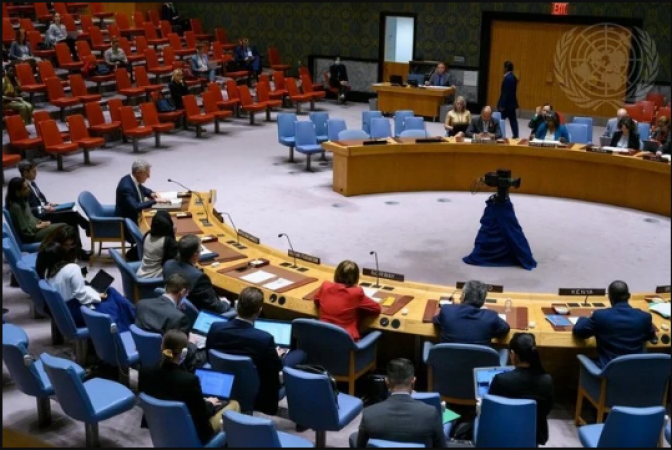
Tehran: The United Nations Security Council was informed on Wednesday that the Iranian people are urging Western governments, especially the US, to abandon any agreement with the Iranian regime that could help ensure its survival. Is.
Council members were warned that any funds Tehran would receive from international agreements would not be used to improve the welfare of its citizens, but to buy more weapons and increase regional and domestic devastation.
Nobel Peace Prize laureate and Iranian lawyer Shirin Ebadi also called on "governments of the free world" to revoke their ambassadorial credentials and downgrade their diplomatic representation in Iran to the allegations.
He urged the United Nations to appoint a commission of inquiry to investigate the most recent crimes and violations of rights committed by the Iranian regime, similar to the organization established in Myanmar.
Also Read: Pope’s Visit to Bahrain: Calls to Address Human Rights Issues are Growing
She was speaking at a Security Council meeting called by Albania and the United States. According to her, the meeting's goal was to draw attention to the regime's "illegal use of force against demonstrators, the pursuit of human rights defenders" as well as the ongoing persecution of women, girls and people belonging to religious and racial minorities in Iran. abroad, and attempt to kidnap or murder them, as well as "credible, international,
The September 16 death in police custody of Mahsa Amini, a 22-year-old woman from Saqqaz in Kurdistan province, who had been detained three days earlier for failing to follow strict rules regarding head coverings, served as the catalyst for the wave. acted as. Anti-government protests that have since spread to Iran.
Since the beginning of the most recent protests, the regime has brutally suppressed unrest, killing at least 300 protesters and arresting more than 14,000 people. The figures are considered conservative estimates by the human rights watchdog.
According to reports, lawyers and journalists who supported or covered the protest were detained. Hundreds of people have been detained and are facing charges that could result in the death penalty. Meanwhile, most of the country's internet access has been blocked by the government.
Independent UN experts have criticized the Iranian government's actions as "a continuation of the long-standing, pervasive, gender-based discrimination embedded in laws, policies and social structures" and expressed support for the "establishment". Is. Establishment of an international investigative mechanism to ensure accountability in Iran and eliminate persistent penalties for serious human rights violations.
Ibadi said during the meeting on Wednesday that the Iranian people's efforts to change the country's circumstances and force reforms have repeatedly "hit a hard wall, but now (Iranians) have something other than a democratic and secular government." Won't settle for it."
Also Read: US Marine who attempted to blow up Indiana mosque converts to Islam
In 14 years of working with human rights activists, Nazanin Boniadi, a Tehran-born British actress and activist, told council members that she had "never seen such widespread and committed opposition to the regime of the Islamic Republic as in Iran today." Is. "
"While Iran has become accustomed to large-scale demonstrations occurring approximately once every ten years, neither the 1999 student uprising nor the 2009 Green Movement, or even the most recent demonstrations in November 2019. comparisons have been made to the fervor or magnitude of the current demonstrations, in which people are openly opposing 83-year-old Supreme Leader Ali Khamenei for the first time since the establishment of the theocracy in 1979, which he began in 2017. Rather actively fighting them.
Iranians and the rest of the world have often been tricked into believing that presidential elections – which have never been free or fair – will change their position. But the Iranian elections are a demonstration.
"The rise to the presidency of Ibrahim Raisi, who has been a pillar of a repressive state and has been linked to crimes against humanity, and whose leadership plagued Iran in the 1980s, is ample evidence that impunity in Iran The culture of liberation is supreme," he said. a supervisor.
Boniadi said that no nation can pursue independence and self-determination on its own and that Iran's future will be "written by its own people, on its streets." Because of this, he urged the Security Council to help the people of the country in their hour of need. "The Islamic Republic is not only a threat to its own people, its human rights abuses have become one of its primary exports," she said.
"The list of abuses by the regime in Iran and around the world is well documented," she said.
Also Read: Pope's visit to Bahrain to strengthen ties with Islam
In addition to intimidating, kidnapping, and murdering dozens of dissidents outside of its borders, the Islamic Republic regime has recently made attempts on the lives of well-known writers and activists just miles away from where we're gathered.
She urged unification of the world as she stated her belief that "the single most important key to bringing about stability in the Middle East" and "the potential for the current protests to transform Iran from theocracy to representative government" could be a geopolitical game changer.